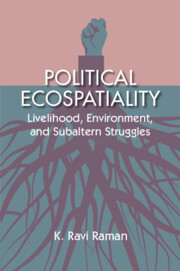Book contents
- Frontmatter
- Contents
- Acknowledgements
- 1 What Is Politics Proper? Why Political Ecospatiality Matters?
- 2 Birlas in Communist Kerala: Clash and Consensus as Subaltern Narratives
- 3 Occupy Muthanga: Land, Forest, and Reinventing Indigeneity and Identity
- 4 Dalits and the Global Cola: Water, Power, and Resistance
- 5 Politics, Epistemology, and Environmental Modernity: Anti-endosulfan as Ethical Practice?
- 6 Caste, Land, and the State: What If Chengara Took the Place of Muthanga?
- 7 Pombilai Orumai: Plantation Dalits, Intersectionality, and Power
- 8 Ecospatiality: Right-Making/State-Making
- Index
2 - Birlas in Communist Kerala: Clash and Consensus as Subaltern Narratives
Published online by Cambridge University Press: 31 August 2024
- Frontmatter
- Contents
- Acknowledgements
- 1 What Is Politics Proper? Why Political Ecospatiality Matters?
- 2 Birlas in Communist Kerala: Clash and Consensus as Subaltern Narratives
- 3 Occupy Muthanga: Land, Forest, and Reinventing Indigeneity and Identity
- 4 Dalits and the Global Cola: Water, Power, and Resistance
- 5 Politics, Epistemology, and Environmental Modernity: Anti-endosulfan as Ethical Practice?
- 6 Caste, Land, and the State: What If Chengara Took the Place of Muthanga?
- 7 Pombilai Orumai: Plantation Dalits, Intersectionality, and Power
- 8 Ecospatiality: Right-Making/State-Making
- Index
Summary
Nehruvian developmentalism reigned supreme in newly independent India in the 1950s and 1960s, and it was against this backdrop that the Soviet-inspired Communist Party came to power in Kerala in 1957, a year after state formation, creating history as the first democratically elected communist government1 in the world. It epitomized a smooth transition to power for the communists, based on the premise of peaceful coexistence as legitimized by Khrushchev in post-Stalinist USSR. While Nehru found inspiration in the Soviet principles of socialism, E.M. Sankaran Namboodirippad, the first communist chief minister of Kerala, in turn, admitted to having borrowed Marxism from Nehru, along with which he would also have been persuaded to open up the newly formed Kerala to state-driven developmentalism. The industrial road was thus extended from Delhi to Kerala with the left government facilitating the entry of Indian capital, the Birlas, to the state by establishing the Gwalior Rayons Silk Manufacturing (Wvg.) Company Ltd, Mavoor, on the outskirts of Kozhikode, which soon became a hub of industrial activity with the company setting up a rayon factory that attracted a huge mass of industrial workers. With hundreds of thousands of jobs on offer, the factory provided fresh employment opportunities for the families in the region; however, the initial euphoria gave way to protests when the pollution of the Chaliyar River by factory effluents became evident, virtually destroying the livelihoods of large numbers of families and rendering the water unusable, eventually forcing the Birlas to leave the state. Although the company did shut down its factory, it left in its wake devastated bamboo forests and a state economy that had suffered heavy losses by supporting the business venture; their departure was thus welcomed by the public even though it meant the loss of livelihood for a huge number of workers.
Mapping Resources: Agreements after Agreements
Surveying and mapping were key instruments of colonialism that remained in use in state-driven development projects in collaboration with big capital, as in the case of bamboo resource mapping and indigenous livelihood in Nilambur-Waynad facilitating the territorial enclosure of resources for the Indian big bourgeoisie in Mavoor. The communist government appointed Sivarajan, the then assistant conservator of forests, to survey the availability of bamboo resources and also assist the state in establishing resource territorial borders for the proposed rayon pulp factory (see Sivarajan 1959).
- Type
- Chapter
- Information
- Political EcospatialityLivelihood, Environment, and Subaltern Struggles in Kerala, pp. 31 - 66Publisher: Cambridge University PressPrint publication year: 2025

